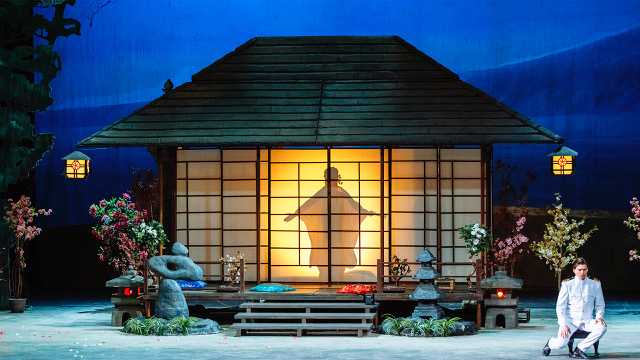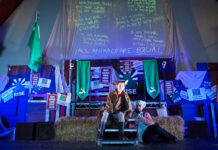Stupendous, stunning, spectacular – all the things we’ve come to expect from Ellen Kent productions over the past four decades, and the performances of Madama Butterfly and Aida at Oxford‘s New Theatre this weekend delivered in spades.
Madama Butterfly is the story of a Japanese geisha who falls in love with and ‘marries’ American naval lieutenant Pinkerton, with predictably tragic consequences.
The stage is set as a traditional Japanese-style tea garden, the chorus dressed in exquisite antique kimonos, twirling parasols and fluttering fans, at times, it resembled a Gilbert and Sullivan production.

There couldn’t be a better introduction to opera for all the children and opera “newbies” who packed the New Theatre on Friday evening.
The fact that the opera company’s singers and musicians, are largely from Ukraine added such poignancy to the performances
However, once Pinkerton abandons his Japanese ‘wife’, the second act is all about Butterfly (the exquisite Korean soprano, Elena Dee), her friend and maid Suzuki (mezzo-soprano Natalia Mateeva) and the American Consul, the voice of wisdom and compassion (baritone Olexandr Forkushak), all parts so beautifully sung that we are completely drawn into the pain of unrequited love and disillusionment, leaving the audience in tears.

Aida followed on Saturday evening, unexpectedly enlivened by interludes from delightful dance students from Stagecoach Theatre Arts, Abingdon and Didcot.
The story of an Ethiopian slave girl, Aida (beautiful performed by Olga Perrier), torn between her love for her father and country, and an Egyptian captain, Radames (Sorin Lupu), who is also loved by a wildly jealous Egyptian princess (Natalia Matveeva, brilliantly dramatic).
The spectacular set, the rich and fabulous costumes, and the choreography, all owe a great deal to Egyptian tomb art, though at times the singing was almost overwhelmed by the weight of the monumental staging.

The lovers succumbing to the stifling conflicts of countries at war seemed an all-too-real reflection of recent (and ongoing) tragedies in Ukraine and elsewhere.
The fact that the opera company, singers and musicians, are largely from Ukraine, added such poignancy to the performances, culminating in the company singing the Ukrainian national anthem at the end of each performance.
The singers, in both productions, were beautifully supported by the Orchestra of the Ukrainian Opera and Ballet Theatre Kyiv, under Vasyl Vasylenko.
Sheila Bailey



















